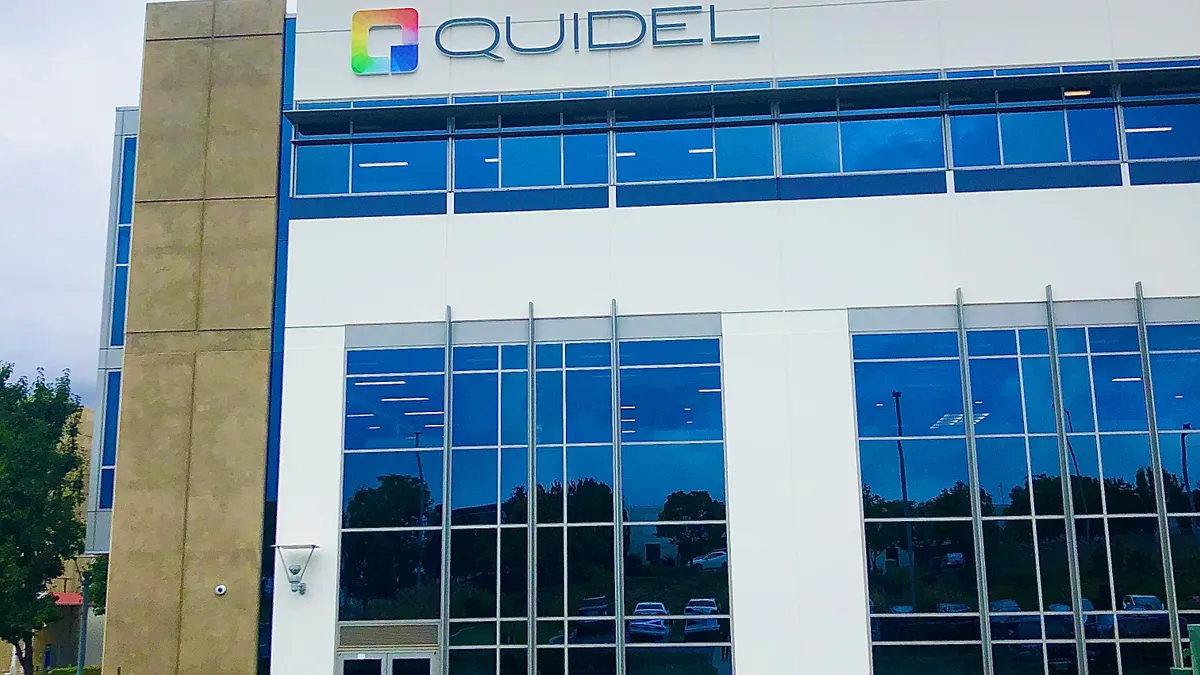Dive Brief:
-
FDA has granted emergency use authorization to Quidel’s instrument-free COVID-19 antigen test, a pregnancy test-style product. Like Abbott’s BinaxNOW, it delivers results in minutes at the point of care and indicates whether a sample contains the coronavirus through the display of a colored line.
-
Quidel, which won the first EUA for an antigen test earlier this year, said the latest is up to five minutes faster than Abbott’s equivalent test. Based on current data, Quidel’s test is more sensitive than its main competitor, although Abbott’s performance was dragged down by a recent update featuring a larger real-world dataset.
-
The EUA clears Quidel to sell a test that it plans to make in large volumes, aiming to hit an annual run rate of 600 million tests by the end of next year. As of Dec. 21, FDA has granted EUAs to 11 antigen tests. By contrast the agency has cleared 233 molecular tests and 62 antibody tests.
Dive Insight:
Visual read lateral flow assays can quickly determine if a person is infected with the coronavirus at the point of care without the use of instruments. As a fast, low cost, simple to use and easy to make at scale testing option, the approach, led by Abbott’s BinaxNOW, has emerged as an important part of the response to the coronavirus.
Quidel is now positioned to contribute to the rise of the approach with its own "dipstick test format" that does not need additional equipment.
Although the the emergency nod applies only to healthcare settings, William Blair analysts noted Quidel's strategy to expand the potential patient population.
"We believe this is just the initial EUA for the product, as management is active in trying to take this product into the at-home setting, potentially for use without a prescription," analysts wrote.
Abbott last week received FDA emergency use authorization for a 15-minute antigen test, making it the first at-home, virtually guided coronavirus diagnostic to get the agency's nod.
FDA granted an EUA to Quidel's latest antigen test on the strength of a comparison of the results generated by QuickVue and a molecular assay. Across 194 samples, QuickVue generated one false positive and two false negatives, resulting in a sensitivity of 96.6% and specificity of 99.3%.
The results are in line with the original data on Abbott’s BinaxNOW, which received EUA on the basis of a study of 102 swabs that linked it to a sensitivity of 97.1% and specificity of 98.5%. However, Abbott has since updated its documents with the results of an expanded study.
Now, Abbott’s EUA paperwork states BinaxNOW has a sensitivity of 84.6% and specificity of 98.5%. The new data come from 10 clinical sites that tested 460 people aged six to 60 years. In patients most likely to be infectious, based on how quickly the PCR comparator detected the virus and when symptoms began, the Abbott assay had a sensitivity of 95.6%.
It is unclear whether the Quidel results are more comparable to the initial or updated Abbott data. Quidel took 156 swabs from three U.S. collection sites. A further 38 samples were taken from three point-of-care sites involved in a prospective clinical study. Two minimally trained operators worked at each point-of-care site.
Quidel’s analysis pools data from all the sites, making it impossible to tell whether performance was affected by the minimally trained operators. The Quidel samples were taken within five days of the onset of symptoms. The window in the Abbott study was seven days. That could make Quidel’s results look better as the virus may be easier to detect shortly after symptoms begin.
Both companies see considerable demand for the tests. Abbott unveiled BinaxNOW in August with plans to make 50 million tests a month by October. Quidel is aiming to scale up to 50 million tests a month next year. Discussing the plan on an investor call in October, Quidel CEO Doug Bryant said the scale reflects Quidel’s plan to provide the test for at-home use. Abbott got clearance for an at-home test last week. Quidel may be close behind.
Quidel reported third-quarter revenue of more than $476 million, a 276% increase compared to the prior year, driven by demand for COVID-19 testing. Bryant has sought to fight off some investor skepticism of the staying power of the demand, giving increasing availability of vaccines.











